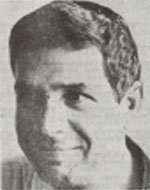Rami, son of Bokica and Yitzhak, was born on September 9, 1939, in Kibbutz Ma’abarot to his parents, who were among the founders of the kibbutz. Rami was educated on the kibbutz and completed his studies at the “Ramot Hefer” educational institution. From his childhood he had excelled in his diligence and diligently studied his studies out of a desire to deepen his knowledge. “When we needed help, we could ask Rami, we knew there was someone to trust and that it would be okay, he had a group responsibility beyond his age, he had a simple talk, a shy and pleasant smile. Reading a story – of Henry or of Maupassen – everything was done patiently, simply, with some timidity, the girls were in love with him, he was Yaffa, nice and captivating, as a guide to help the group find the sense of togetherness, He contributed to parties, trips to the joint camps, there was something Yaffa and good about him that was unique to him. ” Rami was an older man of his own age. Even in his youth he was interested in questions of economics, agriculture and policy. At his own initiative he continued his studies, after completing the twelve years of compulsory schooling. He joined the Political Economy Department, which was held in Givat Haviva, and always came back with a large bundle of questions. He was very interested in how ideology works in everyday life in the socialist countries, and what flaws were discovered there, as opposed to the fulfillment of principles in the kibbutz. He read many books on the subject until early in the morning, sitting and arguing with his friends – how to improve, correct, do everything better. Rami was drafted into the IDF in August 1957 and was assigned to the Armored Corps, where he received a tank course, a course for officers of the Armored Corps, He is very responsible, enterprising, efficient, considerate, serious, of a high professional level and a favorite of his people. “His friends told him:” You can say that he was a ‘commander of a friend.’ When he had to be firm, he could be firm, but he was usually pleasant. He was not one of the mitigators, but not one of the strictest. His team succeeded in bringing about such a situation, in which everyone was prepared to give life for the other. “In late July 1960, after he was discharged from regular service and set out for civilian life, Rami returned to the kibbutz and devoted himself entirely to agricultural work and especially to the cultivation of the subtropical groves. And brought them to such a level that it attracted the attention of the Ministry of Agriculture and the Volcani Institute for Agricultural Research, which maintained constant contact with Rami, who also received a special visit from the Ministry of Agriculture and then Prime Minister Levi Eshkol . After returning from the tour, he served as regional representative in the National Committee for Avocado and as a member of the professional council of the Ministry of Agriculture’s training and professional service, and acted in a blessed manner, without neglecting him. Rami was one of the initiators of the Avocado regional packing house, and was instrumental in mechanizing and improving the pecan industry. Understanding the needs of the agriculture and the problems of society together Water and Rami was sent to a course for training farm coordinators at the Ruppin Graduate School, and then concentrated the Maabarot farm for three consecutive years – his last three years. His friends in the kibbutz say that thanks to him, the kibbutz has developed much more than the presumption. Nevertheless, Rami was not arrogant and boasted, he always treated his role with awe, mixed with the fears of a beginner. Rami Naso did notHe served his girlfriend Dalia, and over the years their three children were born: Orit, Nirit and Shai. His friends say there was no limit in his estimation of Delia, and he used to say that they had a sixth sense about each other. He loved his children with infinite love and devoted much of his time and energy to them. In the Six Day War, Rami was among the first on the southern front to reach the canal (the six famous tanks). After the war he was promoted to the rank of Major, and during the Yom Kippur War he fought in the battle against the Syrians in the Golan Heights, and his comrades told him that he was very calm and cold and calm and assured his men in battle. 1973), was killed and killed in the battle in the Tel Fares area and was brought to rest in the cemetery of Kibbutz Ma’abarot, leaving a wife, two brothers and a son, a father, a mother, a brother and a sister. Good, efficient, experienced, considerate, stable even in difficult situations, loved by all. “In his memory, the family published a booklet containing the words of friends about his character.
